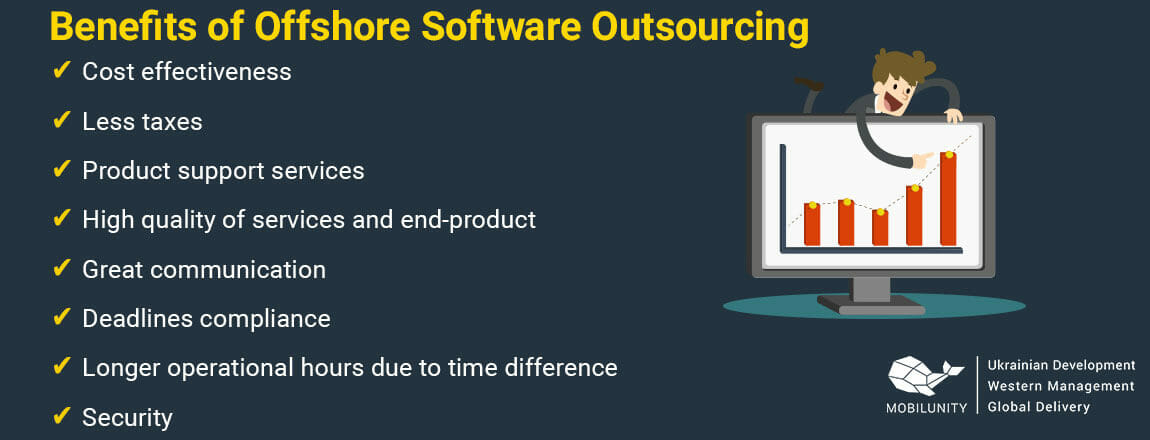
Offshore Development: 8 Main Pros And Cons

Most people know the benefits of offshore software development. Unfortunately, some may also encounter disadvantages. Although outsourcing your IT processes overseas offers many advantages, this approach also has some disadvantages.
What Is Offshore Development?
Deep comprehension of the problem and the optimal decision can be found only if you have a clear understanding of what you are dealing with. In other words, you must clearly understand the definition of offshore development in such a way as to objectively assess its pros and cons.
So, offshore outsourcing of software development is a practice that is widespread nowadays in various companies in various fields. It involves hiring a remote team of Microsoft developers from another country and joining your business on-demand to create software for your project. The main reason why business owners seek out offshore outsourcing providers to design their apps is the price.
Such organizations typically offer a full suite of features, including custom app design, UX research, applications development, and maintenance. Some companies also deliver systems for CRM, ERP, and other enterprise-level services for a broad variety of sectors. Also, in some cases, it is necessary to hire remote Microsoft dynamics developers, because the CRM system from Microsoft is currently in the top 5 CRM systems in the world and the number of customers is gradually increasing from year to year.
8 Main Pros and Cons
It’s time to take a glance at the 8 main advantages and disadvantages of this approach, which will provide you with a better understanding of outsourced software development.
Pros:
-
It Is the Most Efficient and Accessible Option
As mentioned above, offshore development of software is a useful strategy that enables organizations to cut expenses and focus on other important goals of the enterprise. It is a better economical choice since programming services in places such as Vietnam, Ukraine, and China are much cheaper because of the generally reduced standard of living in these countries. On top of cheaper development expenses, they are highly recommended offshore locations for software outsourcing that also offer a wealth of personnel reserves.
-
You Can Choose From the Large Talent Pool Available Around the World.
You need to evaluate many countries before making the decision to hire a particular offshore software development firm. Many of these countries have a large number of talented professionals. In particular, countries such as Vietnam, Ukraine, India, and China have become the most prominent countries for software outsourcing because of their highly qualified, skilled, and trained programmers, acknowledged by a lot of employers as some of the world’s top developers. One more significant benefit of outsourcing software creation overseas is the fact that you do not need to spend time on recruiting, auditioning, and employing the top specialists for your product. All this can be done by the HR manager of the company you are going to work with. This person is specially trained to recognize talent and suggest the best candidates to the employer. This approach allows you to deal with qualified people who know how to do their highly specialized work at the highest level. In theory, you can work with any expert in the market who knows their stuff and knows his way around building applications. This will help you achieve the best results at each step of the design and create software that will win the market competition in the long run.
-
Eliminate Micromanagement and Conserve Time
This is perhaps the most appealing benefit of outsourcing software development overseas. You avoid wasting most of your valuable hours on micro-management, which is among the most labor-intensive activities throughout the whole engineering workflow. Respected firms usually focus on hiring qualified and experienced PMs who oversee the work process, manage the crew, and prevent such unwanted activities as micromanaging your project.
-
Concentrate on Your Individual Activities and Plans
Outsourcing software, in fact, is seen as a profitable and convenient approach to business as it allows you to put the engineering work in the hands of experts and focus on managing the goals and activities of your in-house staff.
-
Broaden Your Horizons by Learning About a Different Mentality and Way of Life
Expanding your professional horizons is very useful for both the company and the team. People get to know their foreign colleagues, encounter new cultures and worldviews. This experience helps the organization build friendships with many foreign companies.
Cons:
-
Existing Threats Related to Intellectual Property Protection
Pay attention to signing an NDA or IP agreement with companies and watch their willingness to do so. This always hints if the company has any “dark” plans for your data and product idea. An intellectual property (IP) agreement is now the only method of protecting your idea, so remember to use it in time to avoid negative consequences for your business.
-
Time Difference as a Challenge
Many companies see time zone differences as a major challenge that threatens the success of a project. However, with excellent project management, it is possible to ensure timely delivery and effective communication regardless of this challenge. Companies with an established reputation always try to do their best to satisfy customers and tailor calls and other types of electronic communication to the time that suits the customer.
-
Language Barrier
When working with companies whose headquarters are located in non-English-speaking countries, you may encounter a language barrier. But companies that provide top-notch service are fluent in English and are constantly working to improve it. So you don’t have to worry about that.
Anyway, the advantages, when used correctly, still outweigh the disadvantages. It just takes experience and knowledge to get the wheel spinning in the right direction and with all the safety precautions.
Different Shapes of Offshoring in 2022
In addition to offshoring, there is also nearshore development and onshoring. First of all, offshoring can be considered in relation to both the production of goods and the provision of services. If offshore resources and personnel are used by companies only to perform small, disparate business tasks, with no intention to carry out larger and more comprehensive offshoring of their business, this phenomenon is called bodyshopping. The opposite process to offshoring, i.e. the search for services and places to locate inside the country (registration or origin) and territories located abroad, is called inshoring. Direct offshoring is preceded by the process of searching and determining the best place for relocation of production and other business processes of the company. This phenomenon, based on quantitative assessment of certain criteria, is called bestshoring or rightshoring. In addition, at the present stage offshoring is mainly represented by the following varieties:
Offshoring of production is a physical restructuring, which is the relocation of physical production processes abroad to the peripheral regions; at the same time offshoring of advanced products with high added value is hampered by weak compliance in the third world with intellectual property laws; offshoring of IT services – relocation.
Working with an offshore software company has both advantages and disadvantages. However, as you can understand from this article, the positive side is more significant and promising.




























